
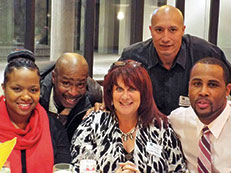
Sponsor the Holiday Party
Help make the PLACES Holiday Party extra-special for every resident, client and tenant we serve. Be a sponsor! Check out the Sponsorship Opportunities and Commitment Form here.
The party will be 5:30–8 p.m., Thursday, Dec. 10, at the Sinclair Conference Center. Please join us! For tickets, contact Kathy Nickell at 937.461.4300.
Thank You, Donors
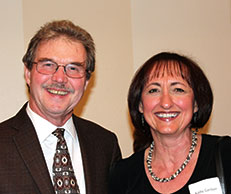 Geoff and Kathy Garrison were among the donors at the Oct. 1 event.
Geoff and Kathy Garrison were among the donors at the Oct. 1 event. Nearly 40 PLACES Heart and Home Legacy Society members attended a donor appreciation event at Moraine Country Club Oct. 1.
PLACES Board of Trustees President William Schuerman thanked retiring board member Andy Storar for his 16 years of service, presenting him with a commemorative plaque and gift certificate.
Andy said his years serving on the PLACES board, including several as president, were some of the most rewarding years of his career. His fondest memory was receiving a giant holiday card signed by many PLACES clients. One client wrote, “Thank you for giving me a home,” a reminder that we should not take our homes for granted, Andy said.
As the event ended, donors received a small token of thanks: a miniature clay pot with a tulip bulb ready for planting.
Celebrating Fall
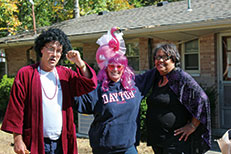
 Top, from left: Marty, a resident at a PLACES Adult Care Facility, enjoys the Fall Harvest Get-Together with Tracey Jones and Joan Bowe, PLACES staff.
Above: The Trick or Treat pumpkin at right by Marty’s House won second place in the pumpkin judging contest.
Top, from left: Marty, a resident at a PLACES Adult Care Facility, enjoys the Fall Harvest Get-Together with Tracey Jones and Joan Bowe, PLACES staff.
Above: The Trick or Treat pumpkin at right by Marty’s House won second place in the pumpkin judging contest.PLACES residents, clients and tenants attended the Fall Harvest Get-Together Oct. 15 at Marty’s House, a PLACES Residential Adult Care Facility. Prizes were awarded for the best decorated pumpkins and most creative costumes. Attendees also enjoyed cornhole, s’mores around the bonfire and ghoulish music.
Eliminating the paper chase
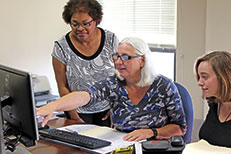 PLACES staff Pam Riggins (left) and Lauren Glass (right) learn the new Paycor system from Barb Stokoe.
PLACES staff Pam Riggins (left) and Lauren Glass (right) learn the new Paycor system from Barb Stokoe.
PLACES said goodbye to paper timesheets, paper checks and personnel card files by moving to Paycor’s Time and Attendance, Payroll and Human Resources (HR) online products in October.
The technology will save 15-20 hours a month for Dave Nuscher, accounting manager, and Barb Stokoe, program manager, at PLACES.
Barb used to spend extra time deciphering handwritten timesheets and inputting payroll data, forcing her to play catchup on her primary job: reporting to funders.
“And, since we bid the project, we’re paying up to $2,000 less a year for this system and less for electronic payroll checks,” Dave said.
Employees use a computer to clock in and out; they also send time-off requests electronically to managers. Any trends such as tardiness or overtime are more apparent, Dave said.
The HR product replaces index cards and Excel spreadsheets Stacy Nolan of PLACES has used to manage employee records and manually compile reports.
“Now we can run reports automatically, and managers can view attendance and training records online,” said Stacy, human resources specialist.
End-of-Summer Luau
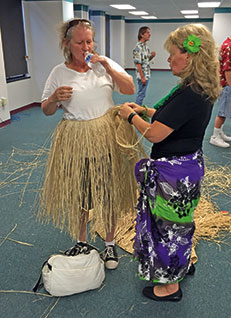 Anna, a resident at Gascho Gardens, a PLACES Adult Care Facility, lets Residential Service Coordinator Tracey Jones help her get ready to dance at a luau for residents, clients and tenants downtown at PLACES Aug. 13.
Anna, a resident at Gascho Gardens, a PLACES Adult Care Facility, lets Residential Service Coordinator Tracey Jones help her get ready to dance at a luau for residents, clients and tenants downtown at PLACES Aug. 13.
James, SLP client: ‘I learned that people do care’
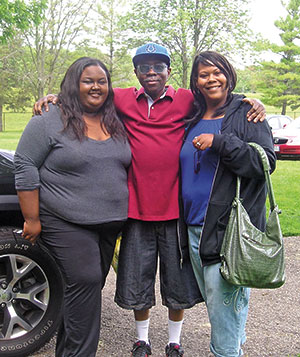 James is a Supportive Living Program client at PLACES.
James is a Supportive Living Program client at PLACES.I used to be homeless, and I’ve been in prison for over half my life. But then two years ago I found PLACES, and they encouraged me. They said, “Don’t worry about your past. Live for your future.”
But I didn’t have any money, or any way to get to the doctor. So PLACES made sure I had a bus pass – and that was a big relief. They treated me like I was a normal human being. They cared for someone they didn’t even know.
I started going to mental health doctors, and I learned I can’t do without medicine. Now every morning, someone from PLACES calls me to say, “Good morning!” and reminds me to take my medicine. Every morning! That means so much to me. It tells me I’m blessed to wake up, and again, PLACES is there.
My caseworkers at PLACES have done so much for me mentally. Once we went on a trip to Young’s Dairy, and on the way back, I had an anxiety attack. My caseworker came around to the back door and sat with me. He was so considerate. He listened. He told me he’d stay with me until I felt comfortable. I will never forget that. I learned that people do care.
Two years ago when my caseworker came to my apartment, there were beers in the fridge. Now there’s not one beer in the fridge, and I’m really proud of that. I’m really proud to be accepted by PLACES. They have changed my life.
Stephanie, SLP client: ‘I am a work in progress’
 Stephanie, a Supportive Living Program client, says her PLACES caseworker Pam has been a blessing to her.
Stephanie, a Supportive Living Program client, says her PLACES caseworker Pam has been a blessing to her.My PLACES caseworker Pam has been such a blessing to me. When I feel down in the dumps, like no one cares, she shows up for my appointment and brings me out of it. It’s like an angel just walked through my door! She calms the whole house down. And I don’t feel so hopeless.
I used to struggle with my housecleaning. Pam taught me how to prioritize things and stop criticizing myself. She taught me to take it easy, not be overwhelmed and just do what you can for the day.
After my cousin passed away, I got really upset and worried about what would happen next. But Pam made me feel calm. She’s kept me sane. She is a loving and caring person.
I want to be productive, so today I’m helping a friend move. He’s a blind man, but he has his own way of seeing things. I’m glad he’s in my life.
I’m also a recovering alcoholic, so I’ve been going to AA meetings, remaining sober one day at a time. And I used to never see my mom – she’s the only parent I have – but now we’ve been spending time together, so it’s been great! It makes me feel wonderful.
My husband and I – we want to go forward with our housing and not backward. We want to find another apartment that’s not in a bad neighborhood – one with a front door and a back door.
I am a work in progress. But life now – it looks good. And I’m proud to be alive.
Supportive Living Program at PLACES
What You May Not Know about SLP
What is the Supportive Living Program (SLP)?
SLP provides wrap-around case management services to adults with mental illness who are able to live independently in the community. Many have substance abuse and chronic health concerns. Because clients struggle with daily tasks, they need intense supportive services.
Does SLP provide mental health treatment?
No. SLP case managers help clients set goals and focus on life skills. They often accompany clients to appointments, train or model skills, help clients access community resources, provide medication prompts and act as a liaison with other providers.
“We’re much more goal-focused now. So we look at each person and ask, ‘What does this person need to be independent?’” – Director of Client Services
How is the program funded?
SLP has two funders: the Alcohol, Drug Addiction and Mental Health Services (ADAMHS) Board of Montgomery County, and the U.S. Department of Housing and Urban Development (HUD) through its Opening Doors for the Homeless initiative.
How do clients receive services?
All SLP clients are referrals from an ADAMHS or a HUD provider.
» ADAMHS clients: ADAMHS funds SLP for clients who are already receiving mental health treatment through community mental health centers and would benefit from secondary case management services.
» HUD clients: HUD funds SLP for clients who are transitioning out of homelessness and on the permanent supportive housing waitlist (approved for a housing subsidy). SLP case managers encourage HUD clients to get linked to a behavioral health agency; if they do, they become HUD/ADAMHS clients at PLACES.
“For ADAMHS clients, we support the work of their primary case manager. That means helping clients decrease their symptoms of mental illness or increase their coping skills: If things are going well, why is today different than yesterday? What must be put in place so things keep going well?
“For HUD clients, we look at what people need to maintain their housing. If someone has been homeless multiple times or evicted, maybe they can’t get the rent paid on time. What’s triggered that? What must be put in place so it doesn’t happen again?” – Shannon Root
Where are services provided?
Clients receive services in their home and in the community as needed from 8:30 a.m.-7 p.m. weekdays and 9 a.m.-5 p.m. weekends. Social activities planned monthly allow clients to practice life skills in the community.
“If a client’s home is normally neat and clean, and an SLP case manager sees dishes, laundry and trash piled up, maybe a client is not taking their medication. We can see what’s happening and get a client back on track.” – Shannon Root
How does the program work?
SLP is a voluntary program that fosters independence; case managers encourage clients to work actively toward their goals. Clients who meet their goals graduate from the program and are discharged.
“We want clients to build confidence so they can integrate into the community and function well independently. We don’t want to be a long-term program.” – Shannon Root
Why is the program unique?
SLP case managers develop quality relationships with clients, providing deep and intense secondary case management services not available anywhere else in Montgomery County. Immersion in the community helps clients learn the life skills they need to remain independent, maintain their housing, and prevent homelessness or hospital recidivism.
What if SLP went away?
Many ADAMHS clients would remain isolated in their homes. Many HUD clients would either be evicted or abandon their housing – and become homeless again.
PLACES improved SLP in FY 2015
| What it means | How clients benefit | |
|---|---|---|
| Team Approach |
SLP now has a team of 10: Two team leaders with partial caseloads, each supervising four case managers who can call on their team leader for assistance in the field. | Clients receive more intensive support and additional perspectives from joint visits with their case manager and the team leader as needed. |
| Lighter Caseloads |
Case managers have time to provide more intensive services to clients. | Clients are being seen more frequently, often every week or two, so they’re making progress faster. |
| Focus on Client-Centered Goals |
Case managers help clients set individual goals to improve their quality of life. Goals now go well beyond socialization only. | Clients are spending more time learning and practicing life skills. |
| Better Documentation |
Case managers help clients identify every step needed to reach their goals. | Clients can track their progress easily, feel a sense of achievement and set new goals over time. |
| Focus on Independence |
Case managers connect clients to community services they can learn to access themselves. | Clients are learning to access resources like food pantries and buses and to solve problems – important for living with confidence and independence after SLP graduation. |
| Monthly Staff Trainings | Case managers are learning more about mental health, recovery, resiliency and individual strengths, and new techniques to engage and motivate clients. | Clients are working even harder to reach their goals. And case managers are better prepared to deal with challenges that arise. |
SLP: How Did PLACES Do in FY 2015?
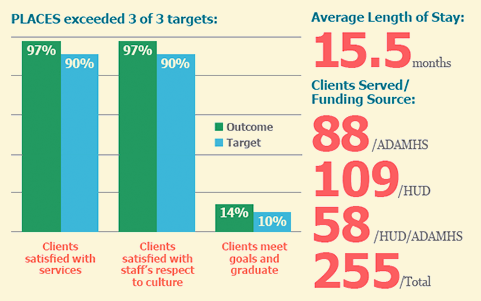
Keeping residents, clients and tenants safe
Q&A panel lets police, PLACES share ideas
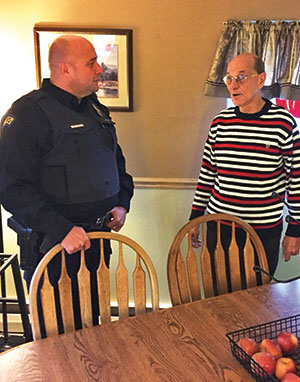 Officer Scott Carico of Dayton makes a friendly visit to Gascho Gardens, a PLACES Residential Adult Care Facility, and talks with Arthur, a resident.
Officer Scott Carico of Dayton makes a friendly visit to Gascho Gardens, a PLACES Residential Adult Care Facility, and talks with Arthur, a resident.Law enforcement officers from Dayton, Huber Heights, Kettering, Moraine and Trotwood reviewed policies, training and roles at a PLACES program this summer.
“We discussed how we can work together to keep residents, clients and tenants safe in their homes and in the community,” said Tracey Jones, PLACES residential service coordinator.
The officers supported the idea of making occasional “friendly visits” to PLACES residential facilities to build good relationships. Recently, a Moraine officer made a friendly visit to Cobblegate, a PLACES Housing First facility. “He wants us to know he’s there for us,” Tracey said.
During the discussion, the officers noted:
» They receive training and continuing education about how to handle situations involving people with mental illness.
» Policies allow police or a medic to transport a person in crisis to the hospital.
» Any missing person is always an emergency, and police respond immediately.
» Police will do welfare checks if a person has called for help or made a threat.
» Officers rely on PLACES staff to honestly and accurately describe what has happened once they arrive to help a person in crisis.
Officers said a dispute between two residents or tenants could arise simply because of a medication imbalance, and they respond accordingly. Said one officer: “If we have to remove someone like this, they belong in a hospital, not in jail.”
Tracey would like to hold another panel discussion with officers from Vandalia, Miamisburg and the Montgomery County Sheriff’s Office since they were unable to attend the summer session. “This first discussion opened the door for even more communication in the future,” she said.
Officers said they were willing to attend resident and tenant meetings to discuss the responsibilities of both police and citizens.
“Interactions like these will let our clients see officers as people who can keep them safe,” said PLACES Executive Director Roy Craig. “It’s about building relationships, getting to know each other and working together for a vulnerable population.”



